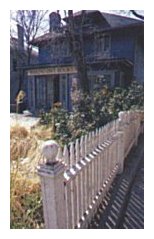
Vol. 9 No. 1 THE MAGAZINE OF THE UNIVERSITY OF UTAH Summer 1999
Continuum Home Page
- University of Utah Home Page - Alumni
Association Home Page
Questions, Comments - Table of Contents
AND FINALLY
Not In My Neighborhood
By Mary Dickson
For 22 years, the Waking Owl Bookstore, which specialized in literary fiction, was an important part of the University neighborhood. Like many other University employees, students, and faculty, I was a regular at the small bookstore in the blue clapboard house on 13th East, whiling away lunch hours browsing in the store, always certain to run into friends. The shop's well-read staff, most of them U students or graduates, offered far more than just advice about what books to buy. The store's manager once brought my book order to my home when I was sick. She was the same woman who found me a new malamute when mine died.
 The
Waking Owl was a shop steeped in tradition. I never missed its annual
Christmas party offering hot cider, wine, the store's trademark owl cookies,
holiday discounts, and eclectic readings to its many friends. At the Waking
Owl, a literary Christmas was always guaranteed.
The
Waking Owl was a shop steeped in tradition. I never missed its annual
Christmas party offering hot cider, wine, the store's trademark owl cookies,
holiday discounts, and eclectic readings to its many friends. At the Waking
Owl, a literary Christmas was always guaranteed.
So was a good laugh. There were the timely local messages printed on the cash register receipts, like the one offered during the Congressional scandal: "Oh, Enid, we hardly knew ye." And I've collected stacks of the famed Waking Owl bookmarks; almost every book scattered around my house holds one, bearing such witty epigrams as that of David Sedaris ("You look like I need a drink") or Garrison Keillor ("If you watch TV news you know less about the world than if you drank gin straight from the bottle"). I also have back issues of the store's beautifully penned newsletter, reflecting the inimitable droll wit of British-born proprietor, Patrick deFreitas MPA'97.
Everybody who worked at the store seemed to be a writer or to have excellent taste in books. Over the years, I learned to head straight to the little slips of paper taped to the bookshelves. Written on them were thoughtful mini-reviews by literate staffers like Marcelyn Ritchie BA'85 MFA'98 (now at the U of U Press), leading to undiscovered treasures. If Marcelyn or Patrick recommended a book, I bought it.
The Waking Owl invited writers of local and national repute – many of them connected to the University – to offer intimate readings of their latest works. The shop was the kind of place that created a community among customers who carved out their own traditions. For me, it was a perfect place to spend a quiet Sunday afternoon. For adjunct biology professor and artist Fred Montague, the two-day art opening each November turned into a wonderful kind of holiday open house. Montague also made a tradition of giving students who did well on exams a book from the store. Utah Museum of Fine Arts Director Frank Sanguinetti stopped by on Sundays to buy the Sunday New York Times. Communication professor Mary Strine special-ordered all her books there and recommended books for the store to add to its stock.
That's what made it so hard last January when the Waking Owl closed its doors for good. In its final days, my trusted neighborhood bookstore felt like a ghost town. The shelves slowly emptied of inventory that wouldn't be replaced. A notice at the cash register encouraged customers to continue supporting independent booksellers. A sign on the door gave a phone number for anyone interested in buying the shelves.
DeFreitas held a wake for employees, then manned the register, gracefully accepting condolences from loyal patrons mourning the landmark bookstore that had become another casualty of chains, megastores, and Internet commerce. DeFreitas, never bitter, simply chalked up the demise of his unique store to "the machinations of the capitalist system."
Months later, some members of the University community still mourn the closure. "I count it as a deep personal loss," says Montague. "Although I'm very impressed with the U Bookstore, there's something about the ambiance and the atmosphere of an independent bookstore. A synergistic thing happens in a place like that." Like other professors and bookstore regulars, Strine expresses concern that the demise of independent bookstores will affect what books get published.
The fate of the Waking Owl, though, is about market factors much bigger than books. What troubles me most about the closing of my neighborhood bookstore is what it signals. As small, independently owned shops disappear, localism is vanishing with them. Rising in its place is an impersonal brand of virtual commerce, in which faceless retail giants lay claim to a commercial landscape that looks the same whether you're in Toledo or Tooele. Maybe I'll learn to appreciate the deep discounts and overwhelming selection of the megastores or the convenience of shopping at my computer screen, but I can't help feeling diminished by the loss of a neighborhood shop like the Waking Owl. The store and its literate staff did far more than sell books; together they reflected and helped shape the unique character of our community.
– Mary Dickson BA'76 is manager of creative services at KUED-Channel 7 at the University of Utah.
Continuum Home Page - University of Utah Home Page - Alumni Association Home Page
Questions, Comments - Table of Contents
Copyright 1999 by The University of Utah Alumni Association